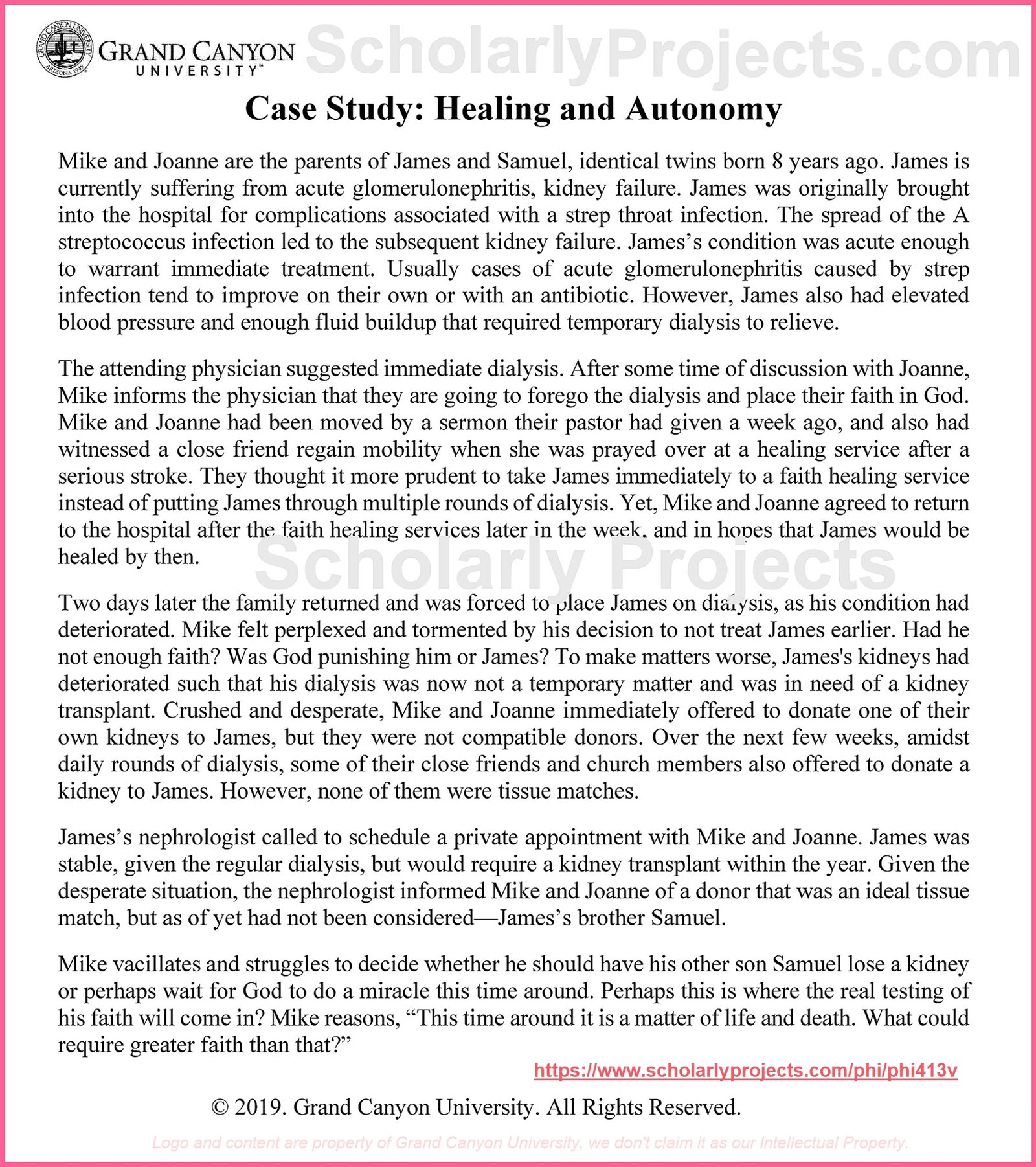In addition to the topic study materials, use the chart you completed and questions you answered in the Topic 3 about "Case Study: Healing and Autonomy" as the basis for your responses in this assignment.
Answer the following questions about a patient's spiritual needs in light of the Christian worldview.
Introduction
Spirituality and religion are crucial factors in most people seeking medical care. Unfortunately, health care professionals might not consider religious beliefs and spiritual needs when they are dealing with complex medical decisions for their patients or their families. This paper analyzes a case involving parental postponement of a medically needed intervention based on religious beliefs in prayers and miracles.
Allowing or Not Mike Continue Making Irrational Decisions
The physician should not have allowed James’s father Mike to continue making decisions that seem illogical and detrimental to James. Although health professionals should respect parental decisions regarding their child’s care, the physician had the legal and ethical responsibility of intervening in situations that are possibly harmful to the child (Katz & Webb, 2016). Mike and James were refusing and postponing the medically needed therapy because they religiously believed that James could be cured by a miracle. The postponement made James’ health to deteriorate to the point of him being put on permanent dialysis and requiring a kidney transplant.
According to Katz and Webb (2016), health professionals have the responsibility of protecting susceptible children from medical neglect. When health professionals encounter a minor who faces danger of disability or death as a result of parents’ inactions, actions or decisions, they are required by the law and obliged by professional standards to report the parents to appropriate authorities. Also, healthcare professionals are ethically justified to carry on life-saving interventions over the objections of the parents as they make the report when the life of the child is in danger. Pediatric health professionals have ethical and legal duties to make decisions and offer care that is beneficial to the pediatric patient and not essentially what the parents request or desire. Benchmark – Patient’s Spiritual Needs: Case Analysis
How a Christian Ought to Think About Health and Sickness
The perceived role of religion in health, illness, and healing is a key influence on the health care behaviors and beliefs of individuals. Some Christians believe that being in good health is compensation for doing good thins while illness is a form of reprisal for the bad things that they have done or as a way of test on their faith. In this case, Mike wonders if he did not have enough faith or if God was punishing him or his son James.
Rumun (2014) asserts that it is common for religious people to ask themselves questions about sickness and why it is happening to them. An individual might believe that sickness is a reprisal for God. If staunch religious faith is an alleyway to good health and shield from all illnesses, then it is thought that sickness is a result of a lack of dedication to the faith. This view might be detrimental to the individual because she or he believes that sickness has befallen her or him due to lack of being adequately devoted and thus affect the way the individual views the illness and healing modalities. Mike sees his Son’s illness as a lack of devotion to his faith, which makes him believe that James can be healed through prayers rather than by medical treatment.
Christians are supposed to think to believe that medical intervention is a way of respecting God’s command for people to seek medical treatment and not as a lack of faith. In Matthew 9: 12, Jesus meant that his disciples were free to look for medical treatment when he said that individuals in good health do not require a physician but ailing individuals need a physician. God does not command Christians to keep away from medicine or to refuse surgery Benchmark – Patient’s Spiritual Needs: Case Analysis. In a real sense, medical knowledge is praised as a God’s gift to benefit his people. Thus Christians have the obligation of seeking medical care as a way of honoring God with their bodies and respecting their bodies as the temple that God gave them (1 Corinthians 6:19-20).
As a Christian, Mike should allow James to undergo the required medical intervention with the belief that God uses health care professionals to heal people. By allowing his son to undergo treatment, it will not mean that God will not heal his son by the prayers, but it means that God can and at times choose to cure those who are sick, but He also expects His people to utilize the provisions that He has provided for them to utilize. After all, doctors treat but God heals.
To honor the beneficence principle, Mike must reflect on his son’s condition and see that a kidney transplant will do him go and save his life. Mike should view beneficence as the conventional function of the medical doctor as the Good Samaritan who comes to the help of the sick and relieves suffering and pain. Benchmark – Patient’s Spiritual Needs: Case Analysis Mike should honor the non-malfeasance principle by observing that accepting a kidney transplant for his son will not be meant to harm or provide an undue burden to his faith, but it will heal his son. He should uphold his trust that through God’s intervention, James will be healed. By permitting the physician to perform a kidney transplant while continuing praying, Mike’s trust in God as the healer, his trust in God will not be shaken.
How A Spiritual Needs Assessment Would Help
A spiritual needs assessment would assist the physician to assist Mike to determine suitable interventions for James and his family members and others involved in the care of James by allowing the physician identify their spiritual needs as they pertain to medical care and to use interventions that will be respectful and responsive to their spiritual beliefs. According to Isaac et al (2016), a spiritual assessment offers a context for discussing the experiences of patients and their families in coping with diseases and beliefs that may contradict medical decisions.
The measures required for spiritually assessing the patient or client include supporting spiritual beliefs, organizing the resources as well as participating in spiritual activities. After the physician has identified the spiritual and religious needs of James’s parents, family and church members, are identified, the decision should be made based on whether the physician is capable of satisfying their spiritual needs or James should be referred to a spiritual or religious person. Isaac et al (2016) assert that since the role of the physician is not to offer spiritual guidance, physicians should patients or their family members to suitable pastoral care so as to address spiritual needs that emerge. Chaplains might be in a better position to offer information to patients and those involved in their care about health risks along with the significance of being more actively interested in their health Benchmark – Patient’s Spiritual Needs: Case Analysis.
References
Isaac, K., Hay, J., & Lubetkin, E. (2016) Incorporating Spirituality in primary Care. Journal of Religion and Health, 55(3), 1065-1077.
Katz, A. & Webb, S. (2016). Informed Consent in Decision-Making in Pediatric Practice. Pediatrics, 138(2) e20161485.
Rumun, A. (2014). Influence of religious Beliefs on Healthcare Practice. International Journal of Education and Research, 2(4), 37-48. Benchmark – Patient’s Spiritual Needs: Case Analysis


